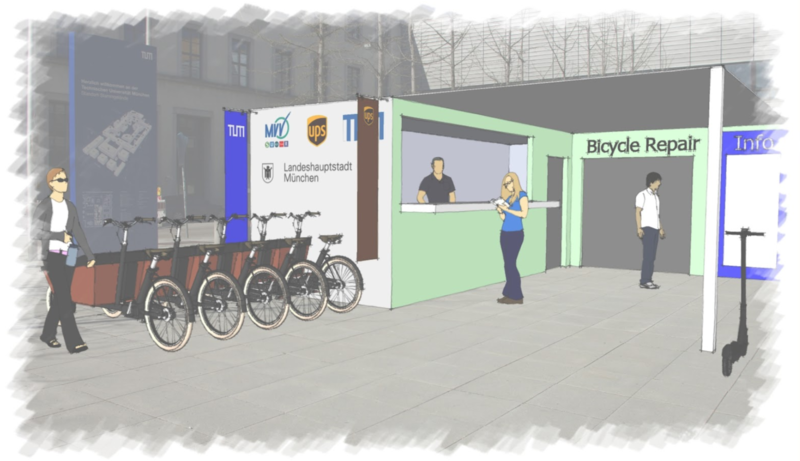
Our main focus is to integrate passenger and freight transport, by placing Access points (UPS) and cargo bicycles near public transport stops and bike-sharing stations. Additional cargo bikes will be provided for renting. The value added of a personal “mobility consultant” will be examined, targeting elderly and digitally limited skilled population groups. A “Wish”list will be available for a co-design of the stations
Governance
1,400,000 in 2019
13,400,000 in 2020
Municipality of Munich (Landeshauptstadt München)
Local Administration:
- Mobility Department (Mobilitätsreferat) Georg Dunkel (no party)
- Mobility Department, Unit for Shared Mobility
- Building Department (Baureferat)
Local Public or Private Stakeholders:
- Stadtwerke München GmbH incl. Münchner Verkehrsgesellschaft (MVG)
Local Networks:
- European Metropolitan Region Munich (EMM)
- Deutsche Plattform für Mobilitätsmanagement (DEPOMM) e.V. (Germany wide)
- Platform 'Wir bewegen Bayern'
- AG Shared Mobility
- Inzell Initiative
- Civitas, Eurocities,
- UITP (SWM/MVG + DB)
Bavarian State Ministry for Housing, Construction and Transport Bavarian, Minister: Kerstin Schreyer (CSU)
- Department 6 'Connected mobility and public transport'
- Münchner Verkehrs- und Tarifverbund GmbH (MVV)
- several regional PT providers
Bundesministerium für Digitales und Verkehr, Minister: Volker Wissing (FDP)
Mobility Strategy as central document for mobility planning in Munich. It replaces old versions of mobility devolpmentplans (Verkehrsentwicklungsplan, VEP). Overall goals of the strategy:
- at least 80% of inner-city traffic by emission-free vehicles, PT, cycling or walking by 2025
- climate neutrality until 2035
- additional specialized goals in sub-strategies
Planned: 19 sub-strategies
- one per mode (PT, walking, cycling, shared mobility + MaaS, individual motorized traffic)
- additionally on specific topics, such as safety, justice, digitalization, financing, regional traffic, etc.
- Strategy on Shared Mobility + MaaS decided on in 2022
See Strategy on Shared Mobility and MaaS
The Sub-Strategy Shared Mobility is part of the overall mobility strategy 2035, see above.
Goal for 2026: Built at least 100-200 mobility hubs in the municipal area of Munich.
- working group 'shared mobility' will meet regularly (every second meeting with representatives of the political parties)
- citizens will be involved in the implementation process of the strategy
- Existing hubs will be transferred into the new concept
- a regional expansion of mobility points will be supported in cooperation with the MVV and MVG
- building department supports with equipment and signage
Related policies:
- all providers (public and private) shall be included and be booked over one central platform shall include
- regulation of car-sharing will be revised
- 600 parking spots for station-based and 1.000 for free-floating car-sharing will be defined until 2026
- strengthened regulation on eScooters